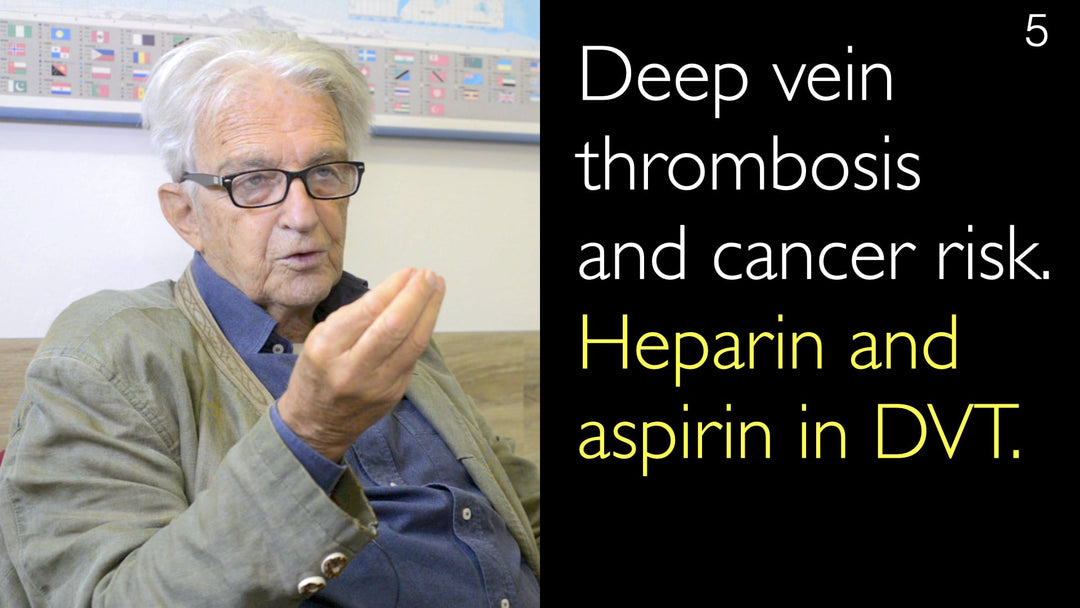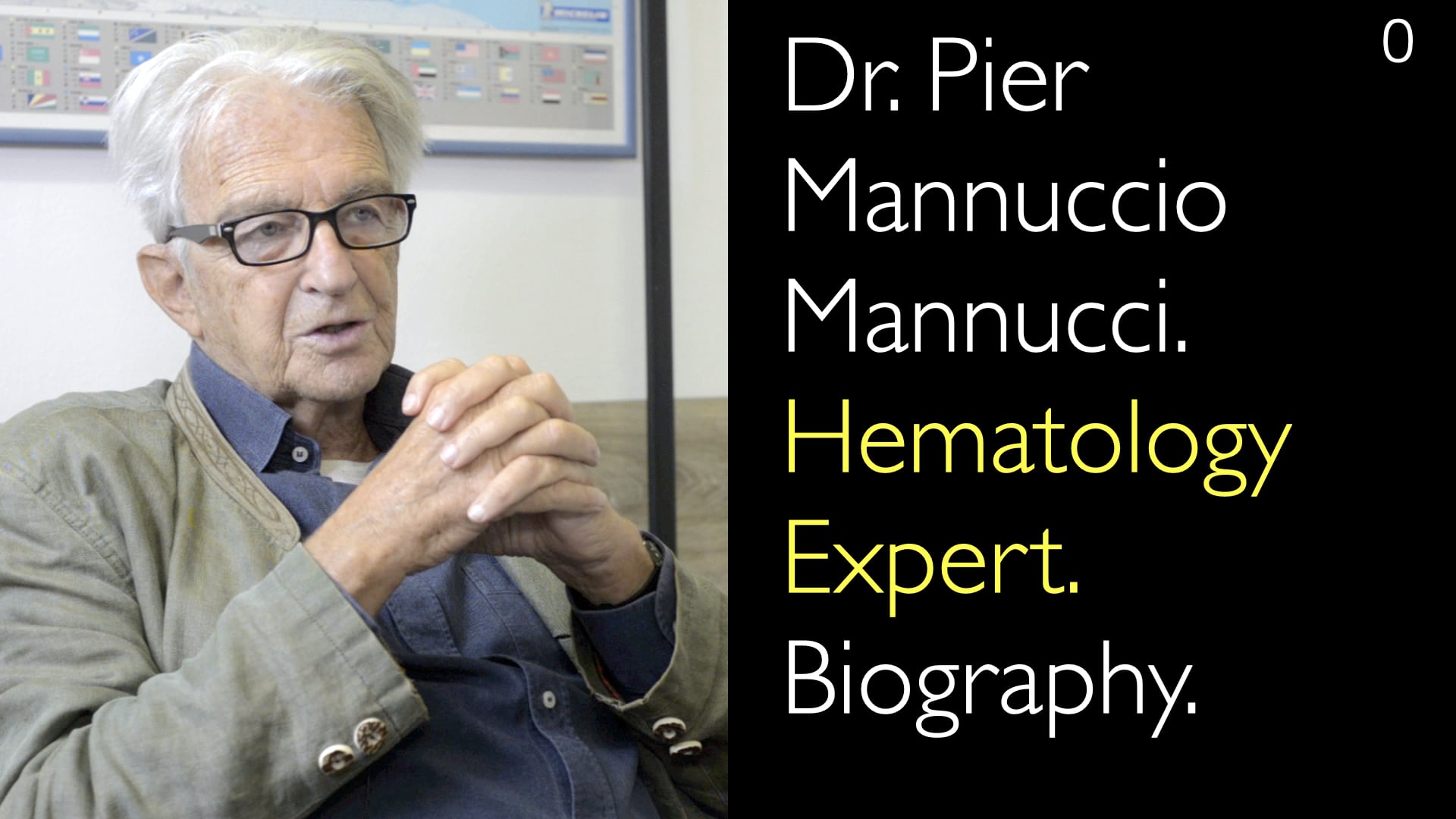מומחה מוביל בתרומבוזיס והמוסטזיס, ד"ר פייר מנוצ'י, MD, מסביר את הקשר המורכב בין סרטן וקרישי דם. הוא מפרט את השימוש בהפרין במשקל מולקולרי נמוך ובנוגדי קרישה אוראליים ישירים למניעה וטיפול בתרומבוזיס בחולי סרטן. ד"ר מנוצ'י מבהיר כי בעוד שפקקת ורידים עמוקה (Deep Vein Thrombosis - DVT) עשויה להוות סימן מוקדם לסרטן, לא מומלץ לבצע בדיקות סקר נרחבות. הוא גם דן בתפקיד המוגבל של נוגדי קרישה בטיפול בסרטן ובנתונים המבטיחים יותר לאספירין במניעת סרטן.
סרטן, קרישי דם וטיפול בנוגדי קרישה: מדריך מקיף
קפיצה לפרק
- הקשר בין סרטן וטרומבוזיס
- אפשרויות טיפול בנוגדי קרישה
- DVT כסימן לסקירת סרטן
- נוגדי קרישה בטיפול בסרטן
- אספירין במניעת סרטן
- המלצות קליניות ומסקנות
- תמליל מלא
הקשר בין סרטן וטרומבוזיס
סרטן מהווה גורם סיכון משמעותי וחזק להתפתחות טרומבוזיס ורידי, במיוחד טרומבוזיס ורידי עמוק (DVT). ד"ר פייר מנוצ'י, MD, מדגיש כי סיכון זה מוגבר משמעותית במהלך שלבי טיפול פעילים בסרטן, כולל כימותרפיה וניתוח. סוגי סרטן מסוימים, כגון סרטן הלבלב וסרטן מערכת העיכול (GI), נושאים סיכון גבוה במיוחד לטרומבוזיס. המצב ההיפרקואגולבילי הקשור בממאירות מצריך נקיטת אמצעים פרואקטיביים לבטיחות המטופל.
אפשרויות טיפול בנוגדי קרישה
לטיפול ומניעה של קרישי דם בחולי סרטן, טיפול בנוגדי קרישה הוא הסטנדרט הטיפולי. ד"ר פייר מנוצ'י, MD, מזהה הפארין במשקל מולקולרי נמוך (LMWH) ונוגדי קרישה אוראליים ישירים (DOACs) כאפשרויות הטיפול העיקריות. הוא מציין כי בעוד ש-DOACs מציעים את הנוחות של מתן אוראלי, הראיות אינן מראות באופן מוצק שהם עדיפים על LMWH. ל-LMWH יש רקורד מבוסס של שנים ככלי הטוב ביותר לטיפול בטרומבוזיס באוכלוסייה הפגיעה הזו, שעלולה להיות תרומבוציטופנית או חלשה מכימותרפיה.
DVT כסימן לסקירת סרטן
אבחנה של טרומבוזיס ורידי עמוק יכולה להיות לעיתים הסימן הקליני הראשון לסרטן סמוי underlying. במהלך שיחתו עם ד"ר אנטון טיטוב, MD, ד"ר מנוצ'י מכיר במציאות קלינית זו. עם זאת, הוא מציג נקודת נגד קריטית מבוססת ראיות: סקירת סרטן מקיפה במטופלים עם DVT לא-מושרה אך ללא תסמינים נוספים אינה מומלצת בדרך כלל. סקירה רחבה כזו הוכחה כלא יעילה מבחינה כלכלית, והחשוב ביותר, אינה משנה את המהלך הסופי של כל סרטן שיתגלה.
נוגדי קרישה בטיפול בסרטן
הרעיון של שימוש בנוגדי קרישה כמו הפארין לטיפול בסרטן עצמו או למניעת גרורות שלו נחקר. ד"ר פייר מנוצ'י, MD, מספק הערכה ברורה של רעיון זה, וקובע כי בעוד נתונים ניסויים מוקדמים היו מבטיחים, מחקרים קליניים בבני אדם היו מאכזבים למדי. הוא מבהיר שנוגדי קרישה ניתנים לחולי סרטן specifically למניעת סיבוכים טרומבוטיים, ולא לשליטה בהתפשטות או בהתקדמות הסרטן. השימוש בהם לטיפול אנטי-סרטני ישיר גורם לעיתים קרובות ליותר בעיות ממה שהוא מיועד למנוע.
אספירין במניעת סרטן
השיחה עם ד"ר אנטון טיטוב, MD, עוברת אז לאספירין, חומר נוגד טסיות. ד"ר פייר מנוצ'י, MD, מדגיש תחום מחקר מבטיח יותר: התפקיד הפוטנציאלי של אספירין במניעת סרטן. מחקרים תצפיתיים גדולים על אלפי אנשים הנוטלים אספירין במינון נמוך למניעה קרדיווסקולרית ציינו שכיחות נמוכה יותר של סרטן, במיוחד סרטן המעי הגס וסרטן שלפוחית השתן. המנגנון המוצע כולל את מניעת היווצרות "גלמים" מגנים סביב תאי סרטן מגרירים. ניסויים קליניים מתמשכים בוחנים specifically יתרון פוטנציאלי זה.
המלצות קליניות ומסקנות
ד"ר פייר מנוצ'י, MD, מסיים בהנחיה קלינית מעשית. הוא מדגיש שההחלטה להשתמש בכל תרופה, כולל אספירין למניעת סרטן פוטנציאלית, חייבת להתבסס על אינדיקציה ראשונית ברורה due לסיכון לתופעות לוואי. לדוגמה, אספירין מוצדק למניעה ראשונית או משנית של אירועים קרדיווסקולריים, כאשר כל הפחתה בסיכון לסרטן היא תועלת משנית פוטנציאלית. הריאיון עם ד"ר אנטון טיטוב, MD, מספק סקירה מעודנת, המפרידה בין שימושים מוכחים של נוגדי קרישה בניהול טרומבוזיס לבין התחומים הספקולטיביים יותר, אם כי מעניינים, של טיפול ומניעה ישירים של סרטן.
תמליל מלא
ד"ר אנטון טיטוב, MD: סרטן ויצירת קרישי דם מוגברת בוורידים coexist לעיתים. טרומבוזיס ורידי עמוק, או DVT, יכול להיות הסימן הראשון לנוכחות סרטן בגוף. הפארין מפורקטיון במשקל מולקולרי נמוך שימש למניעת סיבוכים הקשורים בקרישי דם בחולים שכבר אובחנו עם סרטן. אך להפארין במשקל מולקולרי נמוך עשויה להיות גם תפקיד מניעתי ומגן מפני היווצרות סרטן and especially מפני גרורות סרטן. כיצד עשויים הפארין במשקל מולקולרי נמוך ותרופות נוגדות קרישה אחרות להפחית סיכונים לסרטן ותמותה מסרטן?
ד"ר פייר מנוצ'י, MD: סרטן הוא גורם סיכון ידוע לטרומבוזיס, במיוחד טרומבוזיס ורידי. סרטן הוא גורם סיכון מוצק, חזק בהרבה מאלה שהזכרתי קודם. טרומבוזיס הוא סיכון, במיוחד durante השלב הפעיל של כימותרפיה and עבור סוגים מסוימים של סרטן—סרטן מערכת העיכול, סרטן הלבלב. אך בכל סרטן, במיוחד durante כימותרפיה וניתוח, prophylaxis עם הפארין במשקל מולקולרי נמוך או עם נוגדי קרישה אוראליים חדשים חשוב.
נזכיר זאת later. ככל שמדובר בהפארין, together עם נוגדי קרישה אוראליים ישירים, זה treatment of choice. השימוש בהפארין במשקל מולקולרי נמוך ונוגדי קרישה אוראליים ישירים (DOACs) הוא treatment of choice. some patients, despite אמצעי זהירות זה, מפתחים טרומבוזיס בסרטן.
הוכח ש-compared עם אנטגוניסטים לוויטמין K, קיים סיכון לדימום בחולים העוברים כימותרפיה. הם sometimes תרומבוציטופניים או חלשים. הוכח שהפארין במשקל מולקולרי נמוך הוא הכלי הטוב ביותר למניעה וטיפול בטרומבוזיס.
זה debatable, even though לאחרונה הוכח שנוגדי קרישה אוראליים ישירים שווים להפארין במשקל מולקולרי נמוך. I don't think there's solid evidence that DOACs (NOACs) are superior. But לנוגדי קרישה אוראליים ישירים יש יתרון: you don't have to puncture your belly frequently. So יש some advantages של נוגדי קרישה אוראליים ישירים.
People are convinced they are slightly superior. This is what I think from the point of view of prevention of thrombosis in patients with cancer. It is also for the treatment of thrombosis in those who have cancer and develop thrombosis.
You also mentioned briefly the issue of whether thrombosis can be the first early sign of the presence of cancer. This is a very controversial issue. It is true, based on my clinical experience, that sometimes a suspicion for cancer was aroused by the presence of thrombosis.
But it has been shown that an extensive screening and search for cancer in patients who have no cancer already diagnosed but who develop thrombosis is probably not worthy. Of course, if I added thrombosis to the fact that I may have a stronger risk factor for cancer, which is my age, I would have worried. But I would not have undergone a broad extensive screening for cancer because it has been shown that the screening is not cost-effective in picking up cancer.
Most importantly, screening for cancer after thrombosis finding doesn't affect the course of cancer that will eventually develop. So that is the message.
Another thing you discussed in your introduction is whether low molecular weight heparin or other anticoagulants are effective in the treatment of cancer. There are experimental data that show that inhibiting coagulation and thrombosis may help to avoid the metastasis of cancer, particularly the occurrence of metastasis.
I can tell you that to my knowledge, it is not my cup of tea in terms of my publications. But I think I know quite well the medical literature on this topic. I don't think that there is an attempt to give an anticoagulant, including low molecular weight heparin or unfractionated heparin, to prevent cancer.
If anything, these drugs are given for prophylaxis of thrombosis, but not to control the metastasis and elimination of cancer in patients who have already developed cancer. From that point of view, the experimental data for therapy of cancer with anticoagulants that were quite promising have been quite disappointing.
I'm not sure that this opinion will be shared by everybody. But what I can tell you for sure is that I don't know of any better treatment of cancer than with the multiple drugs, surgery, or radiotherapy that also encompasses the use of anticoagulants. If anticoagulants are given in those situations, they can prevent thrombosis. Anticoagulants are not given to prevent the dissemination of cancer.
That is my candid opinion on this very crucial topic. Of course, there were a lot of expectations, but I think that the clinical studies in humans can be quite disappointing. Anticoagulants often caused more problems than they wanted to prevent.
Aspirin, part of the antiplatelet effect of aspirin, has some data that shows it might prevent the formation of kind of cocoons around the metastasizing cancer cells. There are some statistics in the studies of aspirin that might show there is a little bit less metastasis in people with an already established cancer diagnosis. But of course, it's speculation.
ד"ר אנטון טיטוב, MD: Thank you. You mentioned the story of aspirin. That is a little bit different too, because we are dealing with an antiplatelet agent, not with an anticoagulant.
ד"ר פייר מנוצ'י, MD: That story of aspirin in cancer is more significant and promising, even though it is not yet consolidated. Many people take aspirin for any reason, primary or secondary prevention of cardiovascular disease. There are two huge studies done on thousands and thousands of people.
It has been observed that for those people who regularly took aspirin for primary or secondary prevention, there was a lower incidence of cancer. So it is the incidence, the occurrence of cancer, particularly of the digestive tract, especially cancer of the colon. But cancer incidence was lower also in the digestive tract and other organs, particularly the urinary bladder.
These are promising data. Now there are clinical studies that are ongoing and want to specifically tackle this issue. I haven't seen them published yet. But certainly, if it is necessary for other reasons, taking a low-dose aspirin a day might help prevent the onset of cancer, particularly cancers of the gastrointestinal tract.
I think it is rather promising. However, to tell you the truth, I would not give a drug that has some side effects unless there is another indication to take it. So aspirin is indicated as primary prevention in people with a risk of thrombosis because of other risk factors, particularly for venous thrombosis, or as secondary prevention in people who have already developed a stroke or coronary artery disease. This is my personal opinion.





